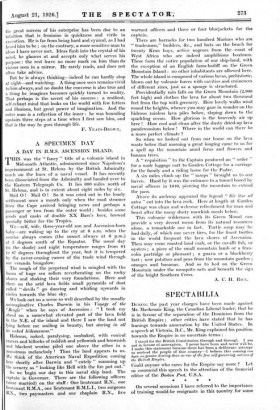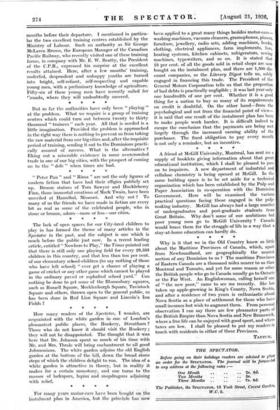SPECTABILIA
DURING the past year charges have been made against Mr. Mackenzie King, the Canadian Liberal leader, that he. is in favour of the separation of the Dominion from the British Empire ; other critics have stated that lie has leanings towards annexation by the United States. In a speech at Victoria, B.C., Mr. King explained his position towards the Empire in no uncertain terms :
standlor tho British Constitution through and through. I am not in favour of annexation. I never have been and never will be. I make this statement because there has been a deliberate attempt to mislead the people of this country—I believe this country can have no greater destiny than as one of the free self-governing nations of the British Empire.
Could anyone who cares for the Empire say more ? Let us commend this speech to the attention of the financial editor of the Boston Post, U.S.A.
On several occasions I have referred to the importance of training would-be emigrants in this country for some months before their departure. I mentioned in particu- lar the two excellent training centres established by the Ministry of Labour. Such an authority as Sir George McLaren Brown, the European Manager of the Canadian Pacific Railway, who recently visited one of these training farms, in company with Mr. E. W. Beatty, the President of the C.P.R., expressed his surprise at the excellent results attained. Here, after a few months' training, underfed, despondent and unhappy youths are turned into bright, self-reliant, self-respecting and capable young men, with a preliminary knowledge of agriculture. Fifty-six of these young men have recently sailed for f:anada, where they will undoubtedly succeed.
• But so far the authorities have only been "playing at the problem. What we require is a group of training centres which could turn out between twenty to thirty thousand " trainees " each year. All that is needed is a little imagination. Provided the problem is approached in the right way there is nothing to prevent us from taking the raw material from our big cities and, after the requisite period of training, sending it out to the Dominions practi- cally assured of success. What is the alternative ? Eking out a miserable existence in some overcrowded trade in one of our big cities, with the prospect of coming on to the " dole " when times are bad.
"Peter Pan" and " Rima " are not the only figures of modem fiction that have had their effigies publicly set up. Bronze statues of Tom Sawyer and Huckleberry Finn, those immortal creations of Mark Twain, have been unveiled at Hannibal, Missouri. And why not ? To many of us the friends we have made in fiction are every bit as real as some of the celebrated people, who in stone or bronze, adorn—more or less—our cities.
The lack of open spaces for our City-bred children to play in has formed the theme of many articles in the Spectator in the past, and the subject is one which is much before the public just now. In a recent leading article, entitled "Nowhere to Play," the Times pointed out that there is still only one playing field for every 29,533 children in this country, and that less than ten per cent. Of our elementary school-children (to say nothing of those who have left school) "ever get a chance of playing a game of cricket or any other game which cannot be played in the ordinary paved or asphalted school yard." Can nothing be done to get some of the Bloomsbury squares, such as Russell Square, Mecklenburgh Square, Tavistock Square and others, thrown open to the general public, as has been done in Red Lion Square' and Lincoln's Inn Fields ?
* * How many readers of the Spectator, I wonder, are acquainted with the white garden in one of London's pleasantest public places, the Rookery, Streatham ? Those who do not know it should visit the Rookery ; they will not be disappointed. The thought that it was here that Dr. Johnson spent so much of his time. with Mr. and Mrs. Thrale will bring enchantment to .all good Johnsonians. The white garden adjoins the old English garden at the bottom of the hill, down the broad stone steps of which the children delight to run. The idea of a white garden is attractive in theory, but in reality it makes for a certain monotony, and one turns to the masses of larkspurs, lupins and snapdragons adjoining with relief.
* * *
For many years motor-cars have been bought on the instalment plan in America, but the principle has now been applied to a great many things besides' motor-cars- washing machines, vacuum cleaners, gramophones, pianos, furniture, jewellery, radio sets, adding machines, books, clothing, electrical appliances, farm implements, fun, heating systems, kitchen Cabinets, refrigerators, sewing machines, typewriters, and so on. It is stated that 13 per cent, of all the goods sold in retail shops are now bought on the instalment plan, -and there are 1,500 dis- count companies, so the Literary Digest tells us, solely engaged in financing this trade. The President of the General Motors Corporation tells us that the proportion of bad debts is practically negligible ; it was last year only one hundredth of one per cent. Whether it is a good thing for a nation to buy so many of its requirements on credit is doubtful. On the other hand—from the psychological and not from the financial point of view— it is said that one result of the instalment plan has been to make people work harder. It is difficult indeed to escape the conclusion that the payments are being met largely through the increased earning ability of the purchaser. The fixed obligation to pay every month is not only a reminder, but an incentive.
* * * A friend at McGill University, Montreal, has sent me a supply of booklets giving information about that great educational institution, which I shall be pleased to psi on to inquirers. A new department of industrial and cellulose chemistry is being opened at McGill. In the same building space is to be set aside for a technical organization which has been established by the Pulp and Paper Association in co-operation with the Dominion Government. Here will be examined the various practical questions facing those engaged in the pulp making industry. - McGill has always had a large number of undergraduates and post-graduate students from Great Britain. Why don't some of our ambitious but poor young men go to McGill University ? Canada would brace them for the struggle of life in a way that a stay-at-home education can hardly do.
Why is it that we in the Old Country know so little about the Maritime Provinces of Canada, which, apart from Newfoundland, are geographically the nearest section of any Dominion to us ? The maritime Provinces of Eastern Canada are a thousand miles nearer to us than Montreal and Toronto, and yet for some reason or other the British people who go to Canada usually go to Ontario or the Far West. An Englishwoman, calling herself one of "the new poor," came to see me recently. She has taken up apple-growing in King's County, Nova. Scotia, and after a residence of two years is enthusiastic about Nova Scotia as a place of settlement for those who have small incomes but wish to augment them. From personal observation I can say there are few pleasanter parts of the British Empire than Nova Scotia and New Brunswick, where a free life can be enjoyed with good sport, and where taxes are low. I shall be pleased to put my readers in touch with residents in either of these Provinces.
TANTUM.



































 Previous page
Previous page